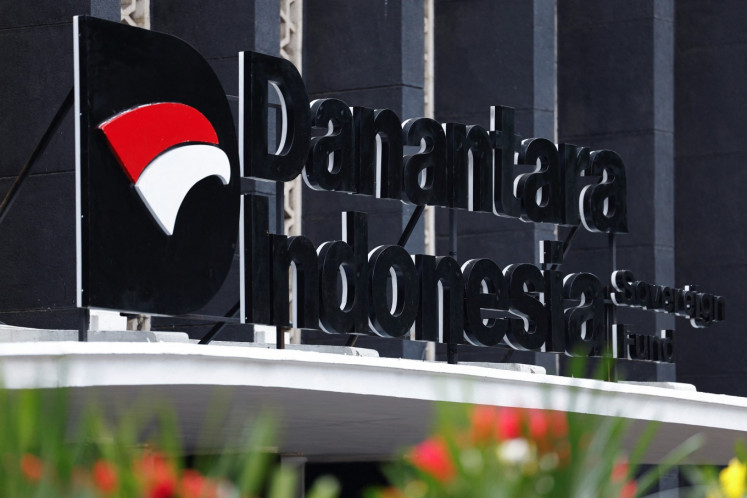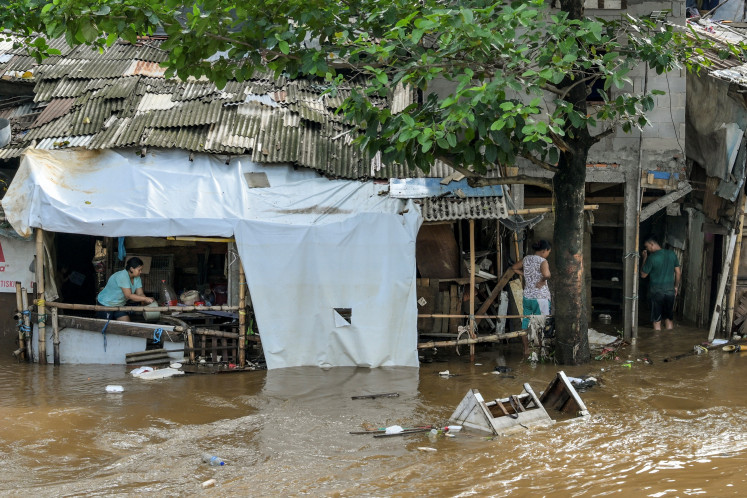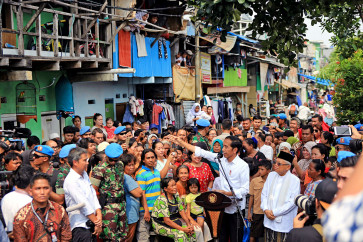Popular Reads
Top Results
Can't find what you're looking for?
View all search resultsPopular Reads
Top Results
Can't find what you're looking for?
View all search resultsIndonesian democracy at its lowest point in almost 20 years: Scholars
Is Indonesia’s much-lauded democracy backsliding?
Change text size
Gift Premium Articles
to Anyone
 Five more years: President Joko “Jokowi” Widodo, accompanied by running mate Ma’ruf Amin, delivers a victory speech to residents of Johar Baru in Central Jakarta on May 21. The General Elections Commission had earlier declared Jokowi and Ma’ruf the winners of the 2019 presidential election with 55.5 percent of the vote, while challengers Prabowo Subianto and running mate Sandiaga Uno secured 44.5 percent. (JP/Seto Wardhana)
Five more years: President Joko “Jokowi” Widodo, accompanied by running mate Ma’ruf Amin, delivers a victory speech to residents of Johar Baru in Central Jakarta on May 21. The General Elections Commission had earlier declared Jokowi and Ma’ruf the winners of the 2019 presidential election with 55.5 percent of the vote, while challengers Prabowo Subianto and running mate Sandiaga Uno secured 44.5 percent. (JP/Seto Wardhana)
I
s Indonesia’s much-lauded democracy backsliding? A growing number of observers agree that Indonesia is not a full democracy, but instead has evolved into some other, more illiberal form of democratic government.
According to Australian National University (ANU) political scientists Edward Aspinall and Marcus Mietzner, Indonesia meets the requirements for an “electoral democracy”, which constitutes “the minimal level in the hierarchy of democratic polities”. But other important features of a full democracy, like protections for minorities, freedom of speech and freedom of organization have all eroded over the course of the Susilo Bambang Yudhoyono and Joko “Jokowi” Widodo presidencies.
Recent events confirm the worrying state of Indonesian democracy. A wave of online and offline protests led by activists, academics and members of the public as well as critical media outlets failed to stop the Jokowi administration and the House of Representatives from deliberating and passing a law amendment that weakens the Corruption Eradication Commission (KPK), a once-independent body that has become the nation’s leading icon in the fight against graft.
Prior to the law amendment, the lame duck lawmakers agreed to revise the Legislative Institutions (MD3) Law to basically allow political parties to get a seat in the People’s Consultative Assembly (MPR) and enable power-sharing among themselves.
But such “collusive” maneuvers are only the most recent examples that serve as symptoms of the country’s “slow but notable democratic decline”, as described by Aspinall and Mietzner during the ANU Indonesia Update conference in Canberra on Sept. 6 and 7.
This year’s Indonesia Update conference bore the theme “From stagnation to regression? Indonesian democracy after twenty years.”
“Political illiberalism, weakening party foundations and escalating sectarian polarization have significantly undermined Indonesia’s democratic quality. This trend, which began in the early 2010s, extended into the 2019 elections and was accelerated by them,” they argued.

















